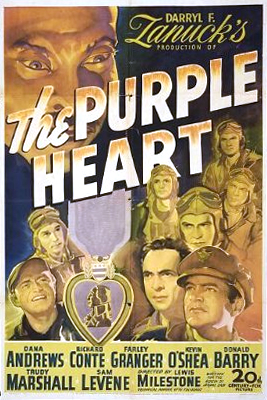
The Purple Heart Page #4
- APPROVED
- Year:
- 1944
- 99 min
- 2,721 Views
And you must eat and rest.
My house is not far.
(speaks Chinese language)
My son joins me
in urging you to accept our invitation.
OK. We'll take a chance. If you're on the level,
we'll never know how to thank you enough.
But if you cross us,
we'll certainly know how to kill you.
(laughs)
As Your Excellencies can see,
of carrying out their promise.
I am still in excellent health.
The court is particularly interested
in any conversations
in which the defendants
mentioned the targets.
Yes, Excellency.
Mistaking me for a possible accomplice,
these men were in a boisterous
and a boastful mood.
They laughed as they told me
how they machine-gunned children
at play in a schoolyard,
and how they destroyed
hospital after hospital
The court can well imagine
how contemptible I felt
having these monsters share my table,
even if it was only for the purpose of
detaining them until Japanese troops arrived.
Brutality! Brutality! Brutality!
He is a liar. We said we hit our targets, but
they weren't hospitals, temples or schools.
They were oil-storage centres,
airports and shipyards.
That's what we hit. That's what we told him.
Excellencies, my son was present at all times.
He will gladly corroborate my statements
if Your Excellencies think it is necessary.
The court has no cause
to suspect the witness of perjury.
You may step down.
Hey, just a minute here.
We got a right to cross-examine...
Get that liar back.
Work on that guy. Break him down.
Our law does not permit cross-examination,
unless the court suspects
the witness did not tell the truth.
- But the witness...
- Look, look. What's the use?
This is a lynching.
General Ito Mitsubi.
I affirm that I will speak the truth,
adding nothing and concealing nothing.
Your name and rank?
Ito Mitsubi,
general in command of military intelligence.
Following the bombings,
did your department photograph
the result of the attacks
on Tokyo, Nagoya, Kobe and Osaka?
It did.
Specifically, did you prepare
motion pictures showing civilian casualties?
- Yes, Excellency.
- Are you ready to display them to the court?
Yes, Excellency.
(speaks Japanese)
This is where the American bombs fell
in Mizu Street in Yokohama.
The court will notice the wreckage of the
Daijingu shrine and many civilian casualties.
Here, you see the result of bombing
and machine-gunning in Nagoya.
- That's not a real air raid.
- Be still.
800 civilian casualties,
and the Buddhist temple of Eihoji destroyed.
Those pictures were made
in an air-raid drill before Japan was at war.
- You know. We were there.
- I wasn't there.
Translation
Translate and read this script in other languages:
Select another language:
- - Select -
- 简体中文 (Chinese - Simplified)
- 繁體中文 (Chinese - Traditional)
- Español (Spanish)
- Esperanto (Esperanto)
- 日本語 (Japanese)
- Português (Portuguese)
- Deutsch (German)
- العربية (Arabic)
- Français (French)
- Русский (Russian)
- ಕನ್ನಡ (Kannada)
- 한국어 (Korean)
- עברית (Hebrew)
- Gaeilge (Irish)
- Українська (Ukrainian)
- اردو (Urdu)
- Magyar (Hungarian)
- मानक हिन्दी (Hindi)
- Indonesia (Indonesian)
- Italiano (Italian)
- தமிழ் (Tamil)
- Türkçe (Turkish)
- తెలుగు (Telugu)
- ภาษาไทย (Thai)
- Tiếng Việt (Vietnamese)
- Čeština (Czech)
- Polski (Polish)
- Bahasa Indonesia (Indonesian)
- Românește (Romanian)
- Nederlands (Dutch)
- Ελληνικά (Greek)
- Latinum (Latin)
- Svenska (Swedish)
- Dansk (Danish)
- Suomi (Finnish)
- فارسی (Persian)
- ייִדיש (Yiddish)
- հայերեն (Armenian)
- Norsk (Norwegian)
- English (English)
Citation
Use the citation below to add this screenplay to your bibliography:
Style:MLAChicagoAPA
"The Purple Heart" Scripts.com. STANDS4 LLC, 2024. Web. 21 May 2024. <https://www.scripts.com/script/the_purple_heart_21139>.


Discuss this script with the community:
Report Comment
We're doing our best to make sure our content is useful, accurate and safe.
If by any chance you spot an inappropriate comment while navigating through our website please use this form to let us know, and we'll take care of it shortly.
Attachment
You need to be logged in to favorite.
Log In